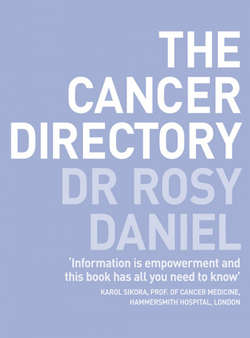Читать книгу The Cancer Directory - Dr. Daniel Rosy - Страница 93
Getting information about your cancer
ОглавлениеAs already discussed in previous chapters, people with cancer vary greatly in the amount of information they wish to receive about their illness. Most doctors have come to respect their patients’ preferences, and most cancer specialists try to answer questions as honestly as they can. Because people differ greatly in their needs, the oncology team will generally be tentative as to how much information to impart to you until they get to know you, and what your needs and preferences are. This is to avoid giving information to those who don’t want it.
You therefore need to make sure that you let them know exactly how much you want to know, and initiate discussions about any aspects they may not be covering. The team will take their cues from you. As you encourage good communication, you will find they will do their best to meet your needs. This is not easy at a stressful time, so having somebody with you and a list of questions you need to have answered will be helpful.
To get the information you want, you have to know what to ask. This is a major problem especially at a time when you are feeling emotionally vulnerable. Many people are unfamiliar with the workings of a car, but are quite happy to nod wisely while the mechanic explains in technical terms what is wrong. But with cancer, you cannot just do that. Having a reasonable understanding of your options makes good sense, and getting information often requires tenacity and persistence. Some doctors and clinics just won’t seem to tell you anything – partly because there is often never enough time. Giving information takes time, especially if it is a genuine dialogue between the doctor and patient. However, it is your life we are talking about, so arming yourself with information is an important way to empower yourself and get yourself back in control.
Living as we do in a consumer age, you have a right to expect high-quality information that allows you to explore different avenues. So, to get to grips with your situation, see the Resources Directory for recommended websites, and other resources for the information you need to guide you to integrated medicine doctors who can help you review your options.
Alternatively, use the Cancer Options team (see the Resources Directory) and have specialist cancer nurses do the research for you, break down the information into clear, readable formats and provide background explanations to the treatments. They can also advise you on how to discuss the treatments with your doctors, how to go about getting a second opinion and how to get into clinical trials. They can then provide you with a report and work through it with you until you feel happy and confident that you have received all the information you need to decide on your best treatment plan.
Another useful method is networking. People diagnosed with cancer often feel they are alone. Yet, once they start discussing their situation with others, they are often surprised to find how many other people known to them or their families are also dealing with cancer. So, find out from them where they are getting their information. They may be using the Internet or specific cancer charities and support groups. However, it is always worth remembering that everyone’s cancer is unique to some degree, and treatments and progress cannot be compared specifically.
Chapter 5 on alternative cancer medicines will provide access to further information with which to arm yourself as you make your treatment choices.
